Related Research Articles

The Italian Wikipedia is the Italian-language edition of Wikipedia. This edition was created on 11 May 2001, and first edited on 11 June 2001. As of 29 April 2024, it has 1,861,304 articles and more than 2,507,983 registered accounts. It is the 9th-largest Wikipedia by the number of articles.

Italy has recognised same-sex civil unions since 5 June 2016, providing same-sex couples with all of the legal protections enjoyed by opposite-sex married couples, excluding joint adoption rights. A bill to allow such unions, as well as gender-neutral registered partnerships, was approved by the Senate on 25 February 2016 and the Chamber of Deputies on 11 May and signed into law by the Italian President on 20 May of the same year. The law was published in the official gazette the next day and took effect on 5 June 2016. Before this, several regions had supported a national law on civil unions and some municipalities passed laws providing for civil unions, though the rights conferred by these civil unions varied from place to place.
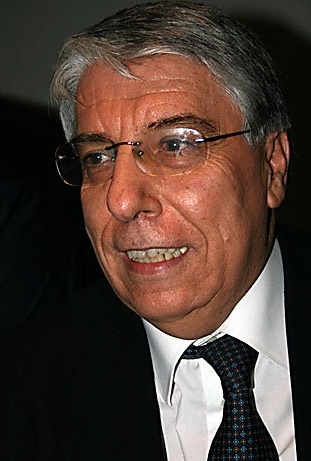
Carlo Amedeo Giovanardi is an Italian politician. He is a former member of the Senate of the Republic and leader of the socially conservative wing of the New Centre-Right party.

Ignazio Benito Maria La Russa is an Italian politician who is serving as president of the Senate of the Republic since 13 October 2022. He is the first politician with a neo-fascist background to hold the position of President of the Senate, the second highest-ranking office of the Italian Republic.

Maria Elisabetta Alberti, known by her married name as Maria Elisabetta Alberti Casellati, is an Italian lawyer and politician, serving as Minister fo Institutional Reforms since 2022. She was President of the Italian Senate from 2018 to 2022. She was the first woman ever to have held this position. Casellati is a long-time member of the liberal-conservative party Forza Italia and served as Undersecretary of Health and Justice in previous governments. In 2022, she was nominated as candidate for President of Italy by the centre-right coalition.

The Dini government was the 52nd government of the Italian Republic. It was the second and last cabinet of the XII Legislature. It held office from 17 January 1995 to 17 May 1996, a total of 486 days, or 1 year and 4 months. It was the Italian Republic's first Government of Experts, entirely composed of experts and officials from outside Parliament.

The Overseas Constituencies consists of four electoral zones which elect Deputies and Senators to the Italian Parliament. Italy is one of the few countries to reserve seats for those citizens residing abroad. Since 2020, there are eight such seats in the Chamber of Deputies and four in the Senate of the Republic.

The Italian electoral law of 2015, also known as Italicum, was an Italian electoral law passed in 2015. The law, which came into force on 1 July 2016, regulated only the election of the Chamber of Deputies, replacing the Italian electoral law of 2005, which had been ruled partly unconstitutional by the Constitutional Court of Italy in December 2013. It provided for a two-round system based on party-list proportional representation, including a majority bonus and a 3% election threshold. Candidates would have run in 100 multi-member constituencies using open lists. The largest party which won over 40% of the vote would automatically win a majority of seats; if no party won 40% of seats, a second round of voting would be held between the two largest parties, with the winner of the second round winning a majority of seats. The name "Italicum" was coined in 2014 by Democratic Party secretary and later Prime Minister of Italy, Matteo Renzi, who was one of the legislation's main proponent.

Maria Elena Boschi, is an Italian lawyer and politician, member of the Chamber of Deputies since 2013.

A constitutional referendum was held in Italy on 4 December 2016. Voters were asked whether they approved a constitutional law that amends the Italian Constitution to reform the composition and powers of the Parliament of Italy, as well as the division of powers between the State, the regions, and administrative entities.
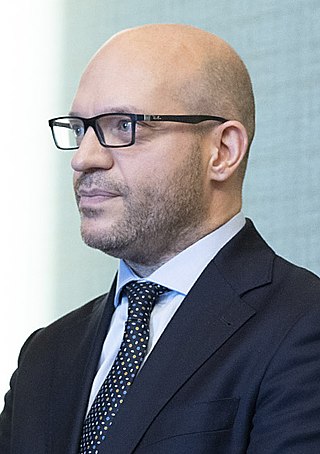
The president of the Chamber of Deputies is the speaker of the lower house of the Italian Parliament, the Chamber of Deputies. It is the third highest-ranking office of the Italian Republic, after the president of the Republic and the president of the Senate. Since 14 October 2022, the role has been held by Lorenzo Fontana.

The Italian electoral law of 2017, colloquially known by the nickname Rosatellum bis or simply Rosatellum after Ettore Rosato, the Democratic Party (PD) leader in the Chamber of Deputies who first proposed the new law, is a parallel voting system, which acts as a mixed electoral system, with 37% of seats allocated using a first-past-the-post electoral system and 63% using a proportional method, with one round of voting. The Chamber and Senate of the Republic did not differ in the way they allocated the proportional seats, both using the largest remainder method of allocating seats.

Ettore Rosato is an Italian politician, member of the Chamber of Deputies, and formerly leader of the Democratic Party in the Chamber.
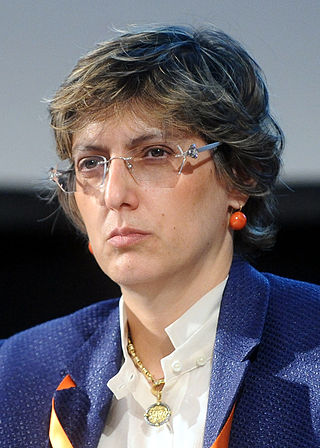
Giulia Bongiorno is an Italian lawyer and politician who served as the Italian Minister of Public Administration from 1 June 2018 to 5 September 2019. A prominent criminal defense attorney, she has served in both houses of the Italian parliament: formerly a member of the Chamber of Deputies from 2008 to 2013, she has served as a Senator of the Italian Republic since 15 March 2018.

The Legislature XV of Italy started on 28 April 2006 and ended on 28 April 2008. Its composition resulted from the election of 9–10 April 2006, called after President Ciampi dissolved the houses on 11 February 2006, at the end of the previous legislature. This legislature was the second shortest in the history of the Italian Republic, lasting exactly two years, and ending when President Giorgio Napolitano dissolved the houses on 6 February 2008, after a vote of no confidence on the incumbent Prodi Cabinet.
Alex Marini is an Italian politician. He was elected as a member of the Regional Council of Trentino-Alto Adige/Südtirol and as a member of the Council of the Italian Autonomous Province of Trento for the Five Star Movement Trentino, local section of the Five Star Movement Italian political party, in 2018.

Emilia-Romagna is one of the 29 constituencies represented in the Chamber of Deputies, the lower house of the Italian parliament. The constituency currently elects 29 deputies, more than any other in the parliament. Its boundaries correspond to those of the Italian region of Emilia-Romagna. The electoral system uses a parallel voting system, which act as a mixed system, with 37% of seats allocated using a first-past-the-post electoral system and 61% using a proportional method, with one round of voting.

Aosta Valley is one of the 29 constituencies represented in the Chamber of Deputies, the lower house of the Italian parliament. The constituency currently elects only one deputy, less than any other in the parliament. Its boundaries correspond to those of the Italian region of Aosta Valley. The electoral system in Aosta Valley uses a first-past-the-post election, with one round of voting.
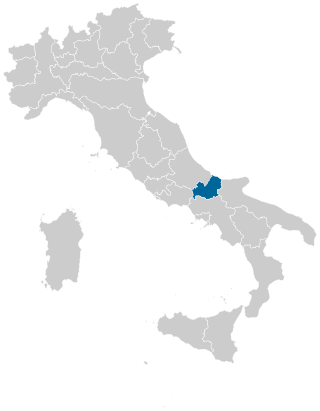
Molise is one of the 29 constituencies represented in the Chamber of Deputies, the lower house of the Italian parliament. The constituency currently elects 2 deputies, less than any other except Aosta Valley. Its boundaries correspond to those of the Italian region of Molise. The electoral system uses a parallel voting system, which act as a mixed system, with half of seats allocated using a first-past-the-post electoral system and half using a proportional method, with one round of voting.
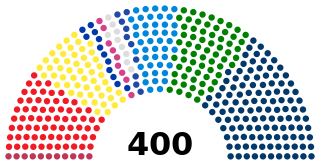
The Legislature XIX of Italian Republic is the current legislature of the Italian Parliament, which started on 13 October 2022.
References
- ↑ In Marco Travaglio opinion, it happens when some scandals expose wrongdoings of the political class, which counters trying to forbid the use of this instrument of criminal prosecutors: "as if to say that if one has a fever, it is the fault of the thermometer" Marco Travaglio, Imbavaglia tua sorella, Fatto quotidiano, 10 April 2016.
- ↑ "Camera dei Deputati: disegno di legge N. 1415-B" (PDF) (in Italian). Camera dei Deputati. 11 June 2010. Retrieved 4 October 2011. (English translation)
- ↑ Buonomo, Giampiero (2000). "Intercettazioni eccessive: ammissibile il ricorso di Bettino Craxi a Strasburgo". Diritto&Giustizia Edizione Online. Archived from the original on 1 August 2012. Retrieved 16 March 2016.
- ↑ "Telecom dossier ricatti". l'Espresso. 11 October 2007.
- ↑ CARBUTTI, ROSALBA. "Prodi: intercettazioni a orologeria. "Da anni diffuse per fini politici"". QuotidianoNet.
- ↑ "DISEGNO DI LEGGE" (PDF). senato.it. 17 April 2007. Retrieved 11 August 2019.
- ↑ "Inchiesta Berlusconi "Saccà va sospeso" L'ex premier: "Solleva il morale del Capo"". la Repubblica (in Italian). 13 December 2007.
- ↑ Scheme of the parliamentary procedures (which started on 30 June 2008).
- ↑ The text formerly (11 June 2009) approved by the Italian Chamber of Deputies.
- ↑ The text modified by the Senate (10 June 2010).
- ↑ Italian bill to limit wiretaps draws fire. BBC News. 11 June 2011. Retrieved 6 October 2011.
- 1 2 "Italian journalists strike over Berlusconi wiretap bill". BBC News. 9 July 2010. Retrieved 6 October 2011.
- ↑ "Camera dei Deputati: disegno di legge N. 1415-B". Camera dei Deputati (in Italian). Retrieved 4 October 2011.
- ↑ "Wikimedia blog » Blog Archive » Regarding recent events on Italian Wikipedia". Blog.wikimedia.org. Retrieved 5 October 2011.
- 1 2 3 Hooper, John (27 September 2011). "Italy's bloggers to protest over 'fascist' right to reply bill". The Guardian . Retrieved 6 October 2011.
- ↑ Taylor, Adam (4 October 2011). "Wikipedia Shuts Down Italian Site In Response To Berlusconi's New Wiretap Act" Business Insider. Retrieved 5 October 2011
- ↑ Andrea Gentile (20 April 2016). "INTERCETTAZIONI: Orlando: "Evitare uso improprio intercettazioni" (Italpress) -".
- ↑ Atto Senato n. 2067 della XVII Legislatura, art. 30.